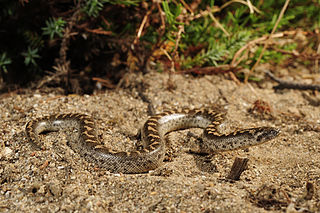Related Research Articles
Evolutionary psychology is a theoretical approach in psychology that examines cognition and behavior from a modern evolutionary perspective. It seeks to identify human psychological adaptations with regards to the ancestral problems they evolved to solve. In this framework, psychological traits and mechanisms are either functional products of natural and sexual selection or non-adaptive by-products of other adaptive traits.
Margo Wilson (1942–2009) was a Canadian evolutionary psychologist. She was a professor of psychology at McMaster University in Hamilton, Ontario, Canada, noted for her pioneering work in the field of evolutionary psychology and her contributions to the study of violence.

David Michael Buss is an American evolutionary psychologist at the University of Texas at Austin, researching human sex differences in mate selection. He is considered one of the founders of evolutionary psychology.

A psychological adaptation is a functional, cognitive or behavioral trait that benefits an organism in its environment. Psychological adaptations fall under the scope of evolved psychological mechanisms (EPMs), however, EPMs refer to a less restricted set. Psychological adaptations include only the functional traits that increase the fitness of an organism, while EPMs refer to any psychological mechanism that developed through the processes of evolution. These additional EPMs are the by-product traits of a species’ evolutionary development, as well as the vestigial traits that no longer benefit the species’ fitness. It can be difficult to tell whether a trait is vestigial or not, so some literature is more lenient and refers to vestigial traits as adaptations, even though they may no longer have adaptive functionality. For example, xenophobic attitudes and behaviors, some have claimed, appear to have certain EPM influences relating to disease aversion, however, in many environments these behaviors will have a detrimental effect on a person's fitness. The principles of psychological adaptation rely on Darwin's theory of evolution and are important to the fields of evolutionary psychology, biology, and cognitive science.

Richard Walter Wrangham is an English anthropologist and primatologist; he is Professor of Biological Anthropology at Harvard University. His research and writing have involved ape behavior, human evolution, violence, and cooking.
Evolutionary developmental psychology (EDP) is a research paradigm that applies the basic principles of evolution by natural selection, to understand the development of human behavior and cognition. It involves the study of both the genetic and environmental mechanisms that underlie the development of social and cognitive competencies, as well as the epigenetic processes that adapt these competencies to local conditions.
Evolutionary educational psychology is the study of the relation between inherent folk knowledge and abilities and accompanying inferential and attributional biases as these influence academic learning in evolutionarily novel cultural contexts, such as schools and the industrial workplace. The fundamental premises and principles of this discipline are presented below.

Jean Decety is an American–French neuroscientist specializing in developmental neuroscience, affective neuroscience, and social neuroscience. His research focuses on the psychological and neurobiological mechanisms underpinning social cognition, particularly social decision-making, empathy, moral reasoning, altruism, pro-social behavior, and more generally interpersonal relationships. He is Irving B. Harris Distinguished Service Professor at the University of Chicago.
Evolutionary psychology seeks to identify and understand human psychological traits that have evolved in much the same way as biological traits, through adaptation to environmental cues. Furthermore, it tends toward viewing the vast majority of psychological traits, certainly the most important ones, as the result of past adaptions, which has generated significant controversy and criticism from competing fields. These criticisms include disputes about the testability of evolutionary hypotheses, cognitive assumptions such as massive modularity, vagueness stemming from assumptions about the environment that leads to evolutionary adaptation, the importance of non-genetic and non-adaptive explanations, as well as political and ethical issues in the field itself.

Stephen W. Porges is an American psychologist and neuroscientist. He is the Professor of Psychiatry at the University of North Carolina at Chapel Hill. Porges is also currently Director of the Kinsey Institute Traumatic Stress Research Consortium at Indiana University Bloomington, which studies trauma.
Joseph Carroll is a scholar in the field of literature and evolution. He received his PhD in Comparative Literature from the University of California, Berkeley and is now Curators’ Distinguished Professor Emeritus at the University of Missouri–St. Louis.

Melanie Killen is a developmental psychologist and Professor of Human Development and Quantitative Methodology, and Professor of Psychology (Affiliate) at the University of Maryland, and Honorary Professor of Psychology at the University of Kent, Canterbury, UK. She is supported by funding from the National Institute of Child Health and Human Development (NICHD), and the National Science Foundation (NSF) for her research. In 2008, she was awarded Distinguished Scholar-Teacher by the Provost's office at the University of Maryland. She is the Director of the Social and Moral Development Lab at the University of Maryland.

Shane R. Jimerson is a professor of Counseling, Clinical, and School Psychology in the Gevirtz Graduate School of Education at the University of California, Santa Barbara.
Arie W. Kruglanski is a social psychologist known for his work on goal systems, regulatory mode, and cognitive closure. He is currently a distinguished professor of psychology at the University of Maryland, College Park.
Darcia Narvaez is a Professor of Psychology Emerita at the University of Notre Dame who has written extensively on issues of character, moral development, and human flourishing.
Mate value is derived from Charles Darwin's theory of evolution and sexual selection, as well as the social exchange theory of relationships. Mate value is defined as the sum of traits that are perceived as desirable, representing genetic quality and/or fitness, an indication of a potential mate's reproductive success. Based on mate desirability and mate preference, mate value underpins mate selection and the formation of romantic relationships.

Sperm competition is a form of post-copulatory sexual selection whereby male sperm simultaneously physically compete to fertilize a single ovum. Sperm competition occurs between sperm from two or more rival males when they make an attempt to fertilize a female within a sufficiently short period of time. This results primarily as a consequence of polyandrous mating systems, or due to extra-pair copulations of females, which increases the chance of cuckoldry, in which the male mate raises a child that is not genetically related to him. Sperm competition among males has resulted in numerous physiological and psychological adaptations, including the relative size of testes, the size of the sperm midpiece, prudent sperm allocation, and behaviors relating to sexual coercion, however this is not without consequences: the production of large amounts of sperm is costly and therefore, researchers have predicted that males will produce larger amounts of semen when there is a perceived or known increase in sperm competition risk.

Dieter Gilberto Hillert is a German-American biolinguist and cognitive scientist. "Dieter Hillert's Google scholar". His research focuses on the human language faculty as a cognitive and neurological system. He is known for work on the neurobiology of language, real-time sentence processing, and language evolution. He advocates comparative evolutionary studies of cognition, argues against tabula rasa models, and favors computational theories of mind.
Thomas A. Widiger is an American clinical psychologist who researches the diagnosis and classification of psychopathology. He is a fellow of the Association for Psychological Science, editor of Personality Disorders: Theory, Research, and Treatment, and co-editor of the Annual Review of Clinical Psychology.
Henry Charles Plotkin was a British evolutionary psychologist who applied Darwinian principles to the understanding of the mind, behavior, culture and knowledge.
References
- ↑ "Evolutionary Psychology: Editorial Board" . Retrieved September 9, 2015.
- ↑ "Evolutionary Psychological Science: Editorial Board" . Retrieved September 10, 2015.
- ↑ "Todd K. Shackelford: Google Scholar Citations" . Retrieved September 11, 2015.